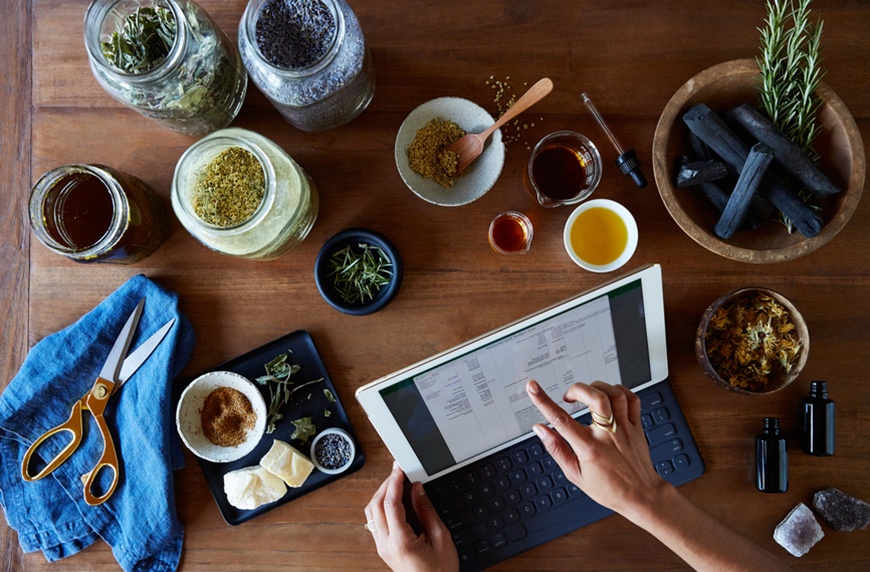Herbs have been used to heal the mind and body for centuries, but only recently have they become part of mainstream Western culture, with more and more people turning to herbs to help with everything from depression, stress and anxiety to bloating and premenstrual syndrome.
But as more people become interested in herbal medicine, a variety of questions arise: What exactly is herbal medicine? How do you find an herbalist you can actually trust? And when should you visit a licensed therapist or doctor instead? To answer these questions, I reached out to Emily Berg, herbalist at NYC health hotspot The Alchemist's Kitchen, to share how you can incorporate plant-based health into your life.
Berg began her studies in botany with a major in environmental studies at Ithaca College, then trained in herbal medicine at Heartstone School of Earth Essentials in Van Etten, New York. Today, Berg specializes in using plants to help people reduce stress, anxiety, depression and adrenal fatigue.
Before turning to herbal medicine, Berg had struggled with anxiety and depression. “I had tried a variety of medications in consultation with a psychiatrist. It wasn't until I stopped taking them and started supplementing with herbs that I really found balance with my mental health,” she says. “Herbs worked for me and I felt inspired to learn more and share my healing experience.”
Related article
Here, she offers some helpful tips on when and how to work with an herbalist, whether it's for your mental, physical, or hormonal health. Read on for her tips.
Here's everything you need to know to get healthy with the help of an herbalist.
 Photo: Stocksy/Trinette Reid
Photo: Stocksy/Trinette Reid
What does a herbalist do and how to find a good one?
Simply put, herbalists use plants for treatment. Unlike medical professionals, herbalists are not licensed, but there are schools and certification programs for training. “Each herbalist is based in a different tradition,” Berg explains, adding that not all herbalists practice the same way. “The herbalists I learned about are based in the northeastern U.S. herbal medicine tradition. But there's also southwestern herbalism, or 'desert herbalism,' which uses herbs native to drier climates, and South American herbalism, which holds things like ayahuasca ceremonies.”
Herbalists seeking certification can expect to study physiology, learning exactly how herbs work on different parts of the body, Berg says. They'll also be taught common herbal formulas so they have an arsenal of potions ready to go when they meet with clients. Many programs also incorporate nature walks, allowing aspiring herbalists to recognize the herbs they're studying in their natural habitat.
To find a trusted herbalist (which is important since they don't require a license), Berg has a few top tips: “Word of mouth is one great way. Another is to look into specific types of herbalists, since a lot of them specialize in something,” Berg says. Berg also mentions another lesser known place to look up local herbalists: Etsy. “Many herbalists sell their wares on Etsy, and this is a way to find a local herbalist,” Berg says.
It's also wise to look into the educational background of a potential herbalist — weekend or short courses are generally a red flag — and it's also a good idea to ask how long the herbalist has been practicing with clients.
 Photo: Stocksy/Trinette Reid
Photo: Stocksy/Trinette Reid
When to consult an herbalist
Berg emphasizes that herbalists are not meant to replace doctors or mental health professionals, but rather have different roles: Qualified medical professionals remain the primary contact for serious issues.
But one reason to consider working with an herbalist is if you're looking for an alternative to pharmaceuticals or want to incorporate lifestyle changes, like stress reduction, into your treatment, she says. Because her specialty is anxiety and depression, she often works with people who want to switch off prescription medications. But be sure to check with your doctor, as not all herbs and medications are compatible.
“Herbs are almost always gentler on the body and have fewer side effects than prescription drugs,” Berg says, adding that they're a great way to gain control over your own healing. “They're also inexpensive.”
The herbalist also shares tips on how to incorporate herbs into your daily life, whether it's for digestion, sleep, relaxation, or even cleaning your home. “Using herbs regularly is a great way to connect with nature, especially if you live in an urban area,” she says. Plus, a few succulents can help.
The only health profession that is becoming more and more popular these days is herbalism. More and more young women are training to become shamans. In this video you will find out what it feels like to receive healing from one of New York's best shamans.


